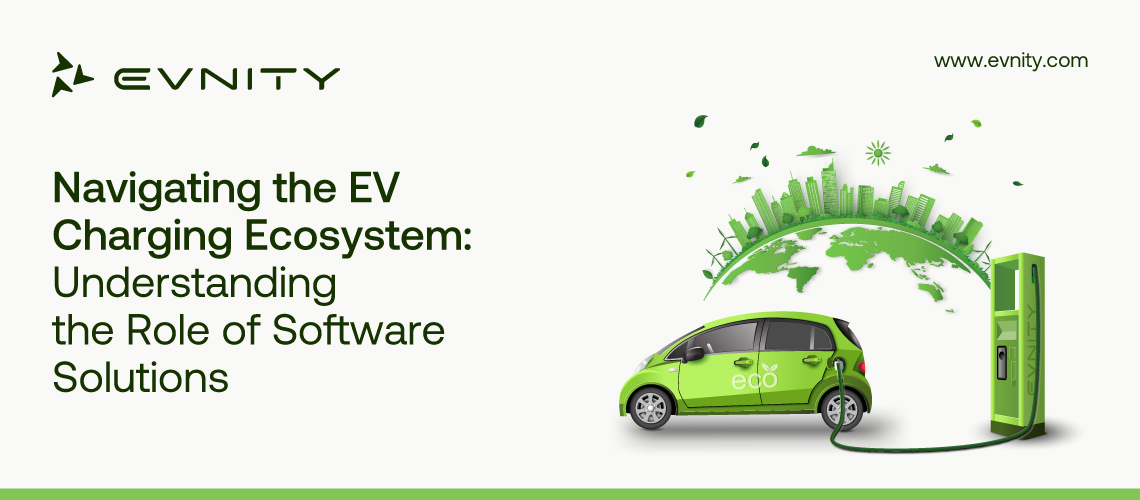Many businesses are switching to electric car fleets as environmental concerns gain attention on a global scale. However, managing an electric vehicle fleet has different challenges and complexities, ranging from ensuring that cars are fully charged and operational to preserving ideal battery conditions. Here's where fleet management software for electric vehicles comes into play.
Operations for electric fleets are streamlined by electric vehicle fleet management software. It allows managers to effectively oversee, control, and repair automobiles. Real-time tracking and energy consumption analysis are provided by the EV charging software.
This blog talks about EV fleet management software, its key features, advantages, and future potential.
Understanding EV Fleet Management Software
The management of electric vehicle fleets has advanced thanks to EV fleet management software. This software is designed exclusively for EVs and goes above and beyond what conventional fleet management systems can offer by concentrating on important areas like battery health, charging infrastructure, and energy efficiency. However, what is Electric Vehicle Fleet Management Software and how is it different from conventional fleet management software?
The software offers a comprehensive platform for fleet management of electric vehicles. It provides real-time data and control, including administration of charging schedules and battery monitoring. To run more sustainably, it combines renewable energy sources and analyzes energy utilization. It concentrates on electric-specific requirements, like battery management, range optimization, and charging station availability.
Fleet managers can take control of their electric fleets and obtain actionable information with the help of electric vehicle fleet management software, which seamlessly integrates functions. This leads to significant cost savings and environmental benefits in addition to improving operational efficiency.
Core Features of EV Fleet Management Software
1. Diagnostics and Tracking of Vehicles
An essential component of EVFMS is real-time vehicle tracking, which gives fleet managers immediate access to the whereabouts of every vehicle in their fleet. Nevertheless, EVFMS goes one step further by adding diagnostics exclusive to electric cars. By keeping an eye on the battery's condition, charge level, and expected range, each vehicle may be used and planned precisely.
2. Energy Consumption and Efficiency Analysis
For an EV fleet to operate profitably, it is essential to comprehend and optimize energy usage. EVFMS technologies provide comprehensive analytics on driving habits that affect energy consumption, efficiency trends, and energy usage. Fleet managers can use this information to pinpoint areas where efficiency can be increased through vehicle maintenance, driver training programs, or route optimization.
3. Upkeep and Maintenance
Even though EVs often require less maintenance than conventional cars, operating reliability depends on monitoring their condition. Predictive maintenance notifications from EVFMS, which are based on diagnostic data and vehicle usage trends, can assist avert unplanned repairs. To help with long-term vehicle management and decision-making, maintenance history records offer a thorough record for every vehicle, and service scheduling tools guarantee that maintenance activities are completed on time.
4. Integrating Renewable Energy Sources
Certain EVFMS platforms have capabilities that make it easier to charge vehicles using solar or wind energy, thereby coordinating fleet management with more general environmental objectives. This lowers the fleet's carbon impact and, by utilizing sustainable energy produced on-site, may result in additional cost savings.
Benefits of Leveraging EV Fleet Management Software
-
Increased Operational Productivity
Vehicle uptime and productivity are maximized with real-time tracking and diagnostics, optimum charging, and energy management that guarantee vehicles are always available for use.
-
Cost-Effective
EVFMS may dramatically reduce the total cost of ownership for electric fleets by optimizing routes for energy efficiency, controlling charging schedules to avoid peak rates, and lowering maintenance costs through proactive diagnostics.
-
Environmental Benefits
Through enhancing energy efficiency, encouraging the use of renewable energy for charging, and lowering emissions, EVFMS helps to lessen the environmental effect of fleet operations.
-
Enhanced Performance and Safety for Drivers
By tracking driving habits, advanced analytics can pinpoint areas where drivers need to improve their performance and raise road safety standards.
Future Trends in EV Fleet Management Software
-
Integrating Machine Learning and AI
EV fleet management will be revolutionized by machine learning (ML) and artificial intelligence (AI). They enhance car diagnostics, route, and charge time optimization, and predictive analytics. These devices analyze massive amounts of data to identify patterns and provide guidance. This increases the dependability and efficiency of EV fleets.
-
5G Technology's Role
5G technology will improve the capabilities of EVFMS. It enables connections between cars, fleet platforms, and charging stations to happen more quickly and reliably. This improves vehicle tracking and real-time data collection. Furthermore supported are remote vehicle control and charging as well as enhanced vehicle-to-grid (V2G) communication.
-
Innovations in Battery Technology
Developments in battery technology are meant to address major problems with electric mobility, such as long charging times and range concerns. EVs will be more useful because of their longer battery life, faster charging times, and increased energy storage. Moreover, this will reduce ownership expenses.
Wrapping It Up
Electric vehicle fleet management software leads the way in revolutionizing fleet operations by providing the instruments and knowledge required to meet the obstacles and reap the rewards of electric mobility. Future technological developments will likely promote the further development of EVFMS, which will increase the cost-effectiveness, sustainability, and efficiency of electric fleets.
A holistic strategy is needed to manage an EV fleet, taking into account technology and infrastructure issues while keeping up with industry developments. Businesses can overcome these obstacles and guarantee that their fleets are not only ecologically friendly but also financially and operationally efficient by implementing the appropriate EVFMS.


